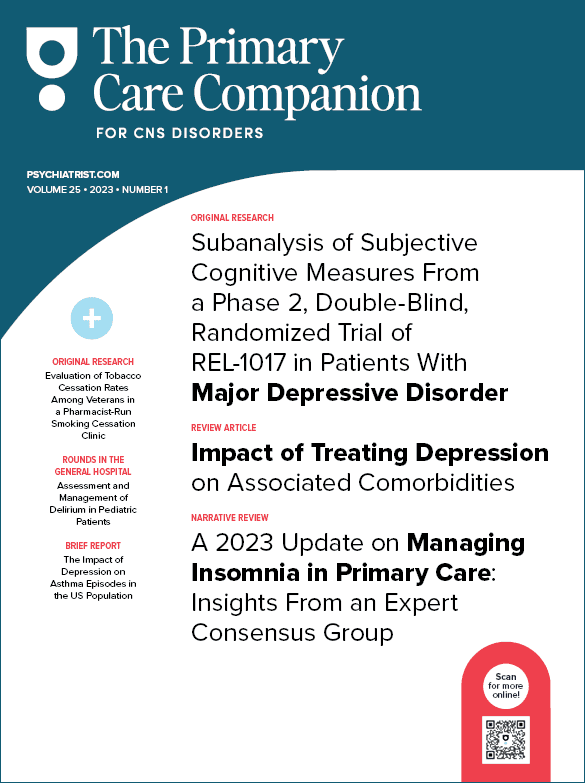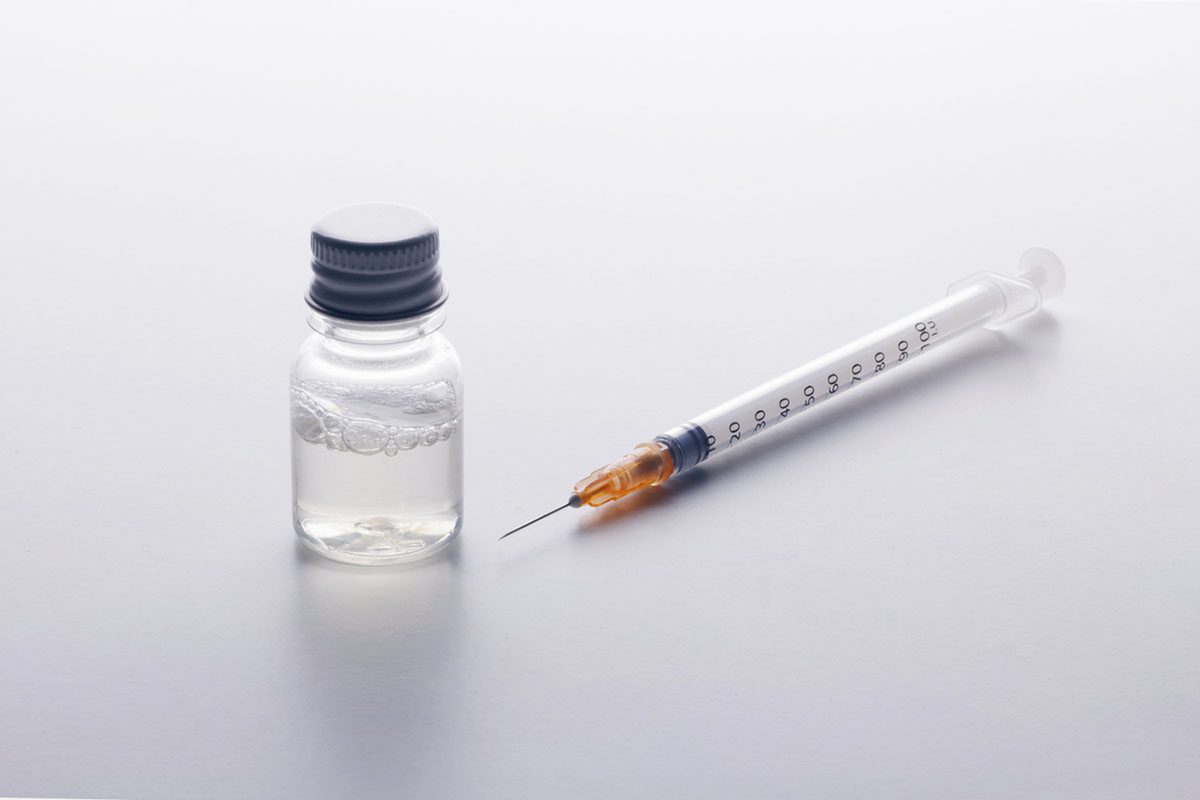Because this piece does not have an abstract, we have provided for your benefit the first 3 sentences of the full text.
To the Editor: Wernicke-Korsakoff syndrome is one of the neurologic complications that may emerge due to thiamine deficiency. Initially defined independently by 2 researchers in the late 19th century as Wernicke’s encephalopathy and Korsakoff syndrome, respectively, the syndrome was finally termed Wernicke-Korsakoff due to the shared etiologic, clinical, and histopathologic characteristics indicated by the former nomenclature. In fact, these 2 syndromes describe the different phases of the single disease.
A Case of Wernicke-Korsakoff Syndrome Treated 1 Year After the Onset of Symptoms
To the Editor: Wernicke-Korsakoff syndrome is one of the neurologic complications that may emerge due to thiamine deficiency. Initially defined independently by 2 researchers in the late 19th century as Wernicke’s encephalopathy and Korsakoff syndrome, respectively, the syndrome was finally termed Wernicke-Korsakoff due to the shared etiologic, clinical, and histopathologic characteristics indicated by the former nomenclature. In fact, these 2 syndromes describe the different phases of the single disease.1,2 The triad of Wernicke’s encephalopathy is classically formulated as ataxia, eye movement abnormalities, and confusion (or memory impairment). It is estimated that merely 20% of cases are diagnosed properly, whereas the majority are misdiagnosed.2,3 Wernicke’s encephalopathy constitutes a medical emergency. Despite the high recovery rates that may be ensured with early treatment interventions, undiagnosed cases may result in the subacute/chronic dementia Korsakoff syndrome.1
Case report. Mr A, a 40-year-old man, was transferred to our drug and alcohol dependency clinic after admission to the emergency department of a general hospital. He had a 25-year history of regular alcohol consumption (2 bottles of wine and 3-4 bottles of beer per day recently). Notably, he gradually increased his alcohol intake. His family stated that for the last 2 years he started his mornings with his usual "eye opener," and he had not been eating enough or regularly. They also described periods of alcohol withdrawal, which resulted in delirium tremens symptoms such as confusion and auditory and visual hallucinations. He presented to the emergency room with forgetfulness, difficulty walking, falling down, urinary incontinence, losing his belongings, and not being able to recognize where he was or the current date. His family also reported that he had been telling incongruent stories that never seemed to have happened.
The physical examination showed that his blood pressure was 100/70 mm HG, heart rate was 79 bpm, and temperature was 36.4 C. He weighed 132 lb (60 kg). His body mass index was 19 kg/m2.
There were no significant findings in his laboratory workup including total blood count, electrolyte level, liver function tests, renal function tests, glucose level, thyroid function tests, cardiac enzyme level, and serologic tests. Chest X-ray revealed no pathologic findings. In order to evaluate dementia etiology, we measured anti-thyroid peroxidase, antithyroglobulin, rheumatoid factor, c-reactive protein, vitamin E, vitamin B, human leukocyte antigen-B27, antinuclear antibody, antineutrophil cytoplasmic antibodies, growth hormone, corticotropin, luteinizing hormone, follicle-stimulating hormone, prolactin, and cortisol blood levels, and the results were within normal range. Furthermore, tumor markers (CA19-9, AFP, CEA, CA125) were within normal range. The fecal occult blood test was negative. Cranial magnetic resonance imaging (MRI) revealed no specific findings. Electroencephalogram showed organizational impairment: frequently repeating medium amplitude theta waves lasting for 1 to 2 seconds, bilaterally in both parietooccipital lobes. The electromyogram result was normal. Neuropsychological tests showed visuospatial function impairment accompanied by moderate to severe memory dysfunction. Memory was impaired in all stages including encoding, storage, and retrieval. His executive functions were impaired.
Mr A was diagnosed with Wernicke-Korsakoff syndrome according to DSM-IV diagnostic criteria, and diazepam detoxification, rehydration, and thiamine repletion therapy were started. He had no signs of alcohol withdrawal in the clinical follow-up. He was administered intravenous (IV) 2,000 cm3 of 5% dextrose and 1,000 mg thiamine hydrochloride. This regimen was administered until the fifth day of treatment since gait ataxia and restriction of eye movements were no longer prominently present. On the sixth day of treatment, the IV thiamine was replaced with 100 mg oral thiamine. Within the third week of the treatment regimen, his gait and postural ataxia improved and his orientation to time, place, and person was intact. By the fourth week of treatment, he was able to find his way around the city and back home when he was on home leave for 2 days. However, it was observed that it took him longer to remember his past experiences when questioned. He was discharged 41 days after his hospitalization. He had no significant mental symptoms apart from a minimally longer reaction time and minimal impairments in current memory, although he still had difficulty in tandem walk and a minimal nystagmus in his neurologic examination at discharge.
This report describes the case of a patient whose first hospital admission was almost a year after the first obvious manifestations of Wernicke-Korsakoff syndrome and who was able to return to his normal life and regain most of his motor and cognitive abilities after intense thiamine repletion therapy. Wernicke’s encephalopathy is a neuropsychiatric disorder that occurs acutely when the thiamine supplies cannot meet the amount needed by the brain. Thiamine deficiency may occur due to inadequate intake, impaired absorption, or depletion; however, the most common cause in the industrialized world is alcohol misuse.4 In our case, Wernicke’s encephalopathy was estimated to result mainly from alcohol misuse; however, it was not clear if malnutrition or any missed malabsorption condition contributed to Mr A’s thiamine deficiency.
If the acute disease is not treated appropriately, it progressively results in Korsakoff syndrome, which is a permanent brain damage leading to memory impairments. The memory deficits in Korsakoff syndrome may be defined as severe impairment wherein the current and recent memories are significantly affected; however, impairment may extend up to 30 years before Korsakoff syndrome and thereafter lead to confabulations.5 In our case, Mr A showed current, recent, and remote memory deficits in his detailed history. He had confabulations persisting for months. Furthermore, he presented to our center with the classical triad including the neurologic components.
Since the classical triad may only be present in a small percentage of cases (16%-20%), it is not rare to miss the clinical diagnosis. In addition, 75%-80% of cases are reported to be missed,5,6 which is consistent with the information gathered from autopsy reports. This confusion concerning the diagnosis is most likely the result of comorbid presence of other causative agents or states of confusion related to alcohol or drug misuse such as effects of alcohol intoxication, head injury, alcohol or benzodiazepine withdrawal, hypoxia, hepatic encephalopathy, or sepsis.6 In our case, alcohol withdrawal treatment was started in order to exclude a present and avoid a future withdrawal. He had no known history of an infection, injury, or acute intoxication. In addition, he greatly benefitted from the thiamine repletion.
Parenteral thiamine repletion should be administered immediately in the case of Wernicke’s encephalopathy to prevent Korsakoff syndrome and mortality. Parenteral thiamine repletion has a mild risk of anaphylactic reaction; however, given in appropriate circumstances, eye symptoms improve within days or weeks. Ataxia generally starts to improve in the early weeks of therapy, but it may take 1 or 2 months or more to recover. Residual nystagmus and ataxia may continue in some patients.7
Current treatment protocols lack a general consensus probably due to the fact that systematic studies on the issue are not sufficient to support a specific guideline.8 Generally, accepted dosage for treatment is 250 mg/d IV and a daily total oral dose of 60 mg given twice a day in the aftermath. The duration is unclear as well9; however, it has been defined with open-ended statements such as "until the clinical improvement draws to an end."8(p232) The daily thiamine requirement is as small as 1-2 mg; however, in order to enable thiamine to pass the blood-brain barrier and effectively enter the central nervous system, initially, doses of 500 to 1,500 mg are suggested.6 According to our observations related to the current case, we suggest more aggressive treatments with rapid high doses and continuing higher oral doses than traditionally recommended. Such a treatment regimen may ameliorate the condition more effectively, leaving less morbidity and disability at the end of treatment.
Neuropathology of Wernicke-Korsakoff syndrome is characterized by gliosis and microhemorrhages specifically in the periaqueductal and paraventricular gray matter, atrophy in the mammillary bodies and thalamus, and volume deficits in the hippocampus, cerebellar hemispheres, pons, and anterior superior vermis; however, anterior thalamus, mammillary bodies, and the mammillo-thalamic tract are reported to be related with later memory impairment and Korsakoff syndrome.1,10 MRI sequences are reported to result in the best visualization and quantification of the neuropathology in Wernicke-Korsakoff syndrome.10 One of the limitations of this case report is that there were no specific findings in the routine plain MRI, and more detailed thin section MRI or fluid attenuated inversion recovery MRI might have been useful to visualize the pathology in more detail.
In conclusion, Wernicke-Korsakoff syndrome is a reversible and treatable, highly underdiagnosed syndrome with high mortality rates. Rapid diagnosis, timely interventions, and higher effective thiamine doses result in better outcomes. However, availability of the more suitable thiamine preparations should be considered in areas in which they are not yet available to enhance the treatment strategies.
References
1. Kopelman MD, Thomson AD, Guerrini I, et al. The Korsakoff syndrome: clinical aspects, psychology and treatment. Alcohol Alcohol. 2009;44(2):148-154. PubMed doi:10.1093/alcalc/agn118
2. Galvin R, Br×¥then G, Ivashynka A, et al; EFNS. EFNS guidelines for diagnosis, therapy and prevention of Wernicke encephalopathy. Eur J Neurol. 2010;17(12):1408-1418. PubMed doi:10.1111/j.1468-1331.2010.03153.x
3. Evren C. Alkol×¼n nöropsikiyatrik etkileri, zehirlenme, çekilme sendromları, Wernicke-Korsakoff Sendromu, tanı, epidemiyolojisi, tedavisi. T×¼rkiye Klinikleri J Psychiatry. 2010;3:37-47.
4. Cook CC, Hallwood PM, Thomson AD. B Vitamin deficiency and neuropsychiatric syndromes in alcohol misuse. Alcohol Alcohol. 1998;33(4):317-336. PubMed doi:10.1093/oxfordjournals.alcalc.a008400
5. Thompson AD, Guerrini I, Marshall EJ. Wernicke’s encephalopathy: role of thiamine. Pract Gastroenterol. 2009;6:21-30
6. Latt N, Dore G. Thiamine in the treatment of Wernicke encephalopathy in patients with alcohol use disorders. Intern Med J. 2014;44(9):911-915. PubMed doi:10.1111/imj.12522
7. Lishman WA. Wernicke’s Encephalopathy. Organic Psychiatry: The Psychological Consequences of Cerebral Disorder. 3rd ed. Oxford, UK: Blackwell Science; 1998.
8. Paparrigopoulos T, Tzavellas E, Karaiskos D, et al. Complete recovery from undertreated Wernicke-Korsakoff syndrome following aggressive thiamine treatment. In Vivo. 2010;24(2):231-233. PubMed
9. Sechi G, Serra A. Wernicke’s encephalopathy: new clinical settings and recent advances in diagnosis and management. Lancet Neurol. 2007;6(5):442-455. PubMed doi:10.1016/S1474-4422(07)70104-7
10. Sullivan EV, Pfefferbaum A. Neuroimaging of the Wernicke-Korsakoff syndrome. Alcohol Alcohol. 2009;44(2):155-165. PubMed doi:10.1093/alcalc/agn103
aDepartment of Psychiatry, Erenkoy Mental Health and Research Hospital, Erenkoy-Kadıkoy, Istanbul, Turkey
Potential conflicts of interest: None reported.
Funding/support: None reported.
Published online: November 26, 2015.
Prim Care Companion CNS Disord 2015;17(6):doi:10.4088/PCC.15l01801
© Copyright 2015 Physicians Postgraduate Press, Inc.
Enjoy free PDF downloads as part of your membership!
Save
Cite
Advertisement
GAM ID: sidebar-top




